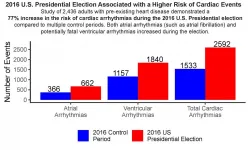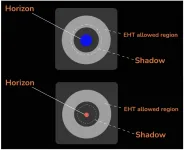(Press-News.org) HOUSTON - Researchers at The University of Texas MD Anderson Cancer Center have developed a first-of-its-kind artificial intelligence (AI)-based tool that can accurately identify rare groups of biologically important cells from single-cell datasets, which often contain gene or protein expression data from thousands of cells. The research was published today in Nature Computational Science.
This computational tool, called SCMER (Single-Cell Manifold presERving feature selection), can help researchers sort through the noise of complex datasets to study cells that would likely not be identifiable otherwise.
SCMER may be used broadly for many applications in oncology and beyond, explained senior author Ken Chen, Ph.D., associate professor of Bioinformatics & Computational Biology, including the study of minimal residual disease, drug resistance and distinct populations of immune cells.
"Modern techniques can generate lots of data, but it has become harder to determine which genes or proteins actually are important in those contexts," Chen said. "Small groups of cells can have important features that may play a role in drug resistance, for example, but those features may not be sufficient to distinguish them from more common cells. It's become very important in analyzing single-cell datasets to be able to detect these rare cells and their unique molecular features."
Developing methods to effectively study small or rare cell populations in cancer research is a direct response to one of the provocative questions posed by the National Cancer Institute (NCI) in 2020, designating this an important and underexplored research area. SCMER was designed to address the issue and to enable researchers to get the most out of increasingly complex datasets.
Rather than the traditional approach of sorting cells into clusters based on all data contained in a dataset, SCMER takes an unbiased look to detect the most meaningful distinguishing features that define unique groups of cells. This allows researchers not only to detect rare cell populations, but to generate a compact set of genes or proteins that can be used to detect those cells among many others. To highlight the utility of SCMER, the research team applied it to analyze several published single-cell datasets and found it compared favorably to currently available computational approaches.
In a reanalysis of more than 4,500 melanoma cells, SCMER was able to distinguish the cell types present using the expression of just 75 genes. The results also pointed to a number of genes involved in tumor development and drug resistance that were not identified as meaningful in the original study.
In a complex dataset of nearly 40,000 gastrointestinal immune cells, SCMER separated cells using only 250 distinct features. This analysis identified all the original cell types detected in the original study, but in many cases further defined subgroups of rare cells that were not previously identified.
Finally, the research team applied SCMER to study more than 1,400 lung cancer cells taken at various points in time after drug treatment. Using just 80 genes, the tool was able to accurately distinguish cells based on treatment responses and pointed to possible novel drivers of therapeutic resistance.
"Using state-of-the-art AI techniques, we have developed an efficient and user-friendly tool capable of uncovering new biological insights from rare cell populations," Chen said. "SCMER offers researchers the ability to reduce highly dimensional, complex datasets into a compact set of actionable features with biological significance."
INFORMATION:
The researchers have made SCMER freely available to the research community.
The research was supported in part by the Human Cell Atlas Seed Network from the Chan Zuckerberg Initiative Donor-Advised Fund, an advised fund of Silicon Valley Community Foundation (CZF2019-002432, CZF2019-02425); the Cancer Prevention & Research Institute of Texas (CPRIT) (RP180248, RP200520); and the National Cancer Institute (U01CA247760, U24CA211006, P30 CA016672).
In addition to Chen, co-authors from MD Anderson include Shaoheng Liang, a graduate student in Bioinformatics & Computational Biology at MD Anderson and Computer Science at Rice University, Houston, TX; Vakul Mohanty, Ph.D., and Jinzhuang Dou, Ph.D., both of Bioinformatics & Computational Biology; Qi Miao and Yuefan Huang, both graduate students in Bioinformatics & Computational Biology at MD Anderson and Biostatistics & Data Science at UTHealth, Houston, TX; and Muharrem Müftüo?lu, M.D., of Leukemia. Additional authors include Li Ding, Ph.D., Washington University of St. Louis, St. Louis, MO; and Weiyi Peng, M.D., Ph.D., University of Houston, Houston, TX. The authors declare no conflicts of interest.
A national study from researchers at Michigan Medicine found that nearly 3% of insured U.S. adults under 65 take medications that weaken their immune systems.
The findings, published in JAMA Network Open, are based on data from over 3 million patients with private insurance. They focus on patients' use of immunosuppressive drugs, including chemotherapy medications and steroids such as prednisone.
The analysis reveals nearly 90,000 people met the study criteria for drug-induced immunosuppression that may elevate risk for severe COVID-19 symptoms and hospitalization ...
Young children who practice visual working memory and reasoning tasks improve their math skills more than children who focus on spatial rotation exercises, according to a large study by researchers at Karolinska Institutet in Sweden. The findings support the notion that training spatial cognition can enhance academic performance and that when it comes to math, the type of training matters. The study is published in the journal Nature Human Behaviour.
"In this large, randomized study we found that when it comes to enhancing mathematical learning in young children, the type of cognitive training performed plays a significant role," says corresponding author Torkel Klingberg, professor in the Department of Neuroscience, Karolinska Institutet. "It is an important finding because it provides ...
A particular type of dendritic cell is responsible for the tissue damage that occurs in non-alcoholic steatohepatits (NASH) in mice and humans. The dendritic cells cause aggressive, proinflammatory behavior in T cells, as now discovered by researchers from the German Cancer Research Center (DKFZ) in collaboration with colleagues from Israeli research institutes. Blocking these dendritic cells alleviates symptoms in mice. This type of approach might also prevent the development of serious liver damage in NASH patients.
Obesity is extremely widespread in the Western world, and 90 percent of those affected show signs of fatty degeneration of the liver. If they maintain an unhealthy lifestyle ...
Solar geoengineering -- putting aerosols into the atmosphere to reflect sunlight and reduce global warming -- is not a fix-all for climate change but it could be one of several tools to manage climate risks. A growing body of research has explored the ability of solar geoengineering to reduce physical climate changes. But much less is known about how solar geoengineering could affect the ecosystem and, particularly, agriculture.
Now, research from the Harvard John A. Paulson School of Engineering and Applied Sciences (SEAS) finds that solar geoengineering may be surprisingly effective in alleviating some of the worst impacts of ...
CHAPEL HILL, NC - American politics can be stressful and confrontational, which can lead to anger. The combination of intense stress and negative emotions can trigger potentially fatal cardiovascular events in people who are susceptible to these health issues. But the direct link between a stressful political election and an increase in cardiac events hadn't been established, until now. A new study in the Journal of the American Heart Association is the first to show that exposure to a stressful political election is strongly associated with an increase in potentially life-threatening cardiac events.
"This retrospective ...
A team led by a social work researcher at The University of Toledo has published the first empirical evidence that emotional support animals can provide quantifiable benefits to individuals with serious mental illness who are experiencing depression, anxiety and loneliness.
The research brings credence to the many anecdotal reports of emotional support animals having positive impacts on chronic mental health issues.
"This is the first peer-reviewed, published scientific evidence that emotional support animals may benefit people's mental health," said Dr. Janet Hoy-Gerlach, a professor of social work and the lead investigator on the project. "My hope is that our pilot study catalyzes additional research in this area with more rigorous ...
FRANKFURT. As first pointed out by the German astronomer Karl Schwarzschild, black holes bend space-time to an extreme degree due to their extraordinary concentration of mass, and heat up the matter in their vicinity so that it begins to glow. New Zealand physicist Roy Kerr showed rotation can change the black hole's size and the geometry of its surroundings. The "edge" of a black hole is known as the event horizon, the boundary around the concentration of mass beyond which light and matter cannot escape and which makes the black hole "black". Black holes, theory predicts, can be described by a handful ...
When scientists hunt for life, they often look for biosignatures, chemicals or phenomena that indicate the existence of present or past life. Yet it isn't necessarily the case that the signs of life on Earth are signs of life in other planetary environments. How do we find life in systems that do not resemble ours?
In groundbreaking new work, a team* led by Santa Fe Institute Professor Chris Kempes has developed a new ecological biosignature that could help scientists detect life in vastly different environments. Their work appears as part of a special issue of theBulletin ...
The chemical bisphenol F (found in plastics) can induce changes in a gene that is vital for neurological development. This discovery was made by researchers at the universities of Uppsala and Karlstad, Sweden. The mechanism could explain why exposure to this chemical during the fetal stage may be connected with a lower IQ at seven years of age - an association previously seen by the same research group. The study is published in the scientific journal Environment International.
"We've previously shown that bisphenol F (BPF for short) may be connected with children's cognitive development. However, with this study, we can now begin to understand which biological mechanisms may explain such a link, which is unique for an epidemiological study." ...
A new study provides public health planning authorities with a method of calculating the number of COVID-19 isolation beds they would need for people experiencing homelessness based on level of infection in the city. The research holds promise for controlling spread of the virus - or future infectious diseases - in a population that is highly vulnerable and less likely than many others to access health care services.
The report, developed to support public health decision-making in Austin, Texas, was recently published by PLOS ONE. The paper's first author is an undergraduate student at The University of Texas at Austin, Tanvi Ingle, who harnessed ...





